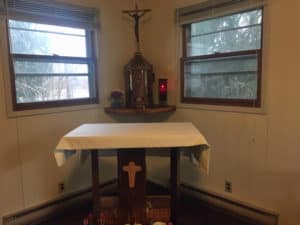Our Lenten journey continues! We offer a Franciscan Gospel reflection and questions written by Fr. Paul Gallagher, OFM for your prayer. They are edited by Franciscan Sister of Christian Charity Sister Anne Marie Lom and Joe Thiel. The excerpts from the Sunday readings are prepared by Joe Thiel. To read or download the complete pdf with excerpts for your prayer, please click here: Franciscan Gospel Reflection March 24 2019 Excerpts are from the Lectionary for Mass for Use in the Dioceses of the United States of America, second typical edition © 2001, 1998, 1997, 1986, 1970 Confraternity of Christian Doctrine, Inc., Washington, DC. Used with permission. All rights reserved. No portion of this text may be reproduced by any means without permission in writing from the copyright owner. Please include this information when printing.
Photos: Warhawk Catholic Campus Ministry Center Chapel, Whitewater, Wisconsin.
LUKE 13:1-9
At that time some people who were present there told him about the Galileans whose blood Pilate had mingled with the blood of their sacrifices. He said to them in reply, “Do you think that because these Galileans suffered in this way they were greater sinners than all other Galileans? By no means! But I tell you, if you do not repent, you will all perish as they did!
Or those eighteen people who were killed when the tower at Siloam fell on them–do you think they were more guilty than everyone else who lived in Jerusalem? By no means! But I tell you, if you do not repent, you will all perish as they did!”
And he told them this parable: “There once was a person who had a fig tree planted in his orchard, and when he came in search of fruit on it but found none, he said to the gardener, ‘For three years now I have come in search of fruit on this fig tree but have found none. So cut it down. Why should it exhaust the soil?’ He said to him in reply, ‘Sir, leave it for this year also, and I shall cultivate the ground around it and fertilize it; it may bear fruit in the future. If not, you can cut it down.'”
BACKGROUND
The description of the two tragic events in this Sunday’s gospel is unique to Luke. They also reveal a basic understanding of people of his day, namely that bad things happen to people as punishment for their transgressions.
There are also some elements in the text that may not be immediately apparent to the contemporary reader. Pilate’s deed reported here is not substantiated by history, but it is in keeping with his reputation, and therefore there is no reason to doubt that it did occur. Pilate was a representative of an occupying foreign government that was greatly disliked. Galilee was known as a center of political animosity toward Rome. To have people murdered while they were in the midst of the ritual of offering sacrifice, thereby mingling their blood with the blood of the animals being sacrificed, would be disgusting, but not out of character for Pilate. If Jesus had remained silent when confronted with this rumor, he would lose credibility with the people. If he spoke out against Pilate, he would be seen as an anarchist.
The other incident mentioned in the text is that some innocent people had a portion of the temple wall collapse on them. The location would have been near the pool of Siloam. Historical records cannot authenticate this incident either. In both incidents, there is a presumption that the tragedy occurred as a punishment for some sin of the victims. Jesus turns these two incidents into a warning that all need to be prepared for the unexpected: Be aware of your own sinfulness and turn toward God before some unexpected event comes upon you.
Then Jesus tells a parable that focuses on the compassionate mercy of God. Luke’s community would see themselves in the parable. The people of Israel were often portrayed as the vineyard of Yahweh. The fig tree planted within the orchard would represent the leader of the people. Fig trees usually bear fruit ten months of the year. When first planted, their fruit is not picked for three years while the tree matures. The fruit of the fourth year is given in sacrifice to God. Since this is the third year the owner has come looking for fruit from this tree, it is presumed to be in its seventh year. The tenant farmer is suggesting that the tree be given an additional year to mature, in hope that it will begin to produce figs. In this culture, everything is believed to be in limited supply, even the nutrients of the earth. To suggest that an unproductive tree be given additional care and nurturing would seem extravagant, and perhaps even wasteful, to the people of the day.
Jesus makes his point about the abundance of God’s mercy with a bit of humor. The gardener who has suggested nurturing the tree with more fertilizer would be using only one kind of fertilizer, manure. The unproductive tree would be understood to represent the religious and civil elite of the day, who are not taking their responsibilities seriously but instead are living well off the fruits of the labors of others. A common person in the crowd would delight in the thought of a gardener liberally spreading manure around the base of this fig tree.
REFLECTION QUESTIONS
1. When I hear of tragic deaths of innocent people, I find myself…
2. When I hear the explanations being offered for why these things have happened, I find myself…
3. When I think of the tragedies that have taken place in my own life, I…
4. If Jesus would have asked me what the gardener should do with barren fig tree, I would have suggested…
5. The gardener’s suggestion that the tree be watered and fertilized for yet another year makes me aware…
6. Can you recall a time when you became aware of your own sinfulness and desire for repentance?
7. Have you ever doubted the mercy of God for yourself?
8. Can you take some time now to talk to God honestly about your need for forgiveness, your fear that you are not truly forgiven for some past sinfulness, or your gratitude for God’s forgiveness?




